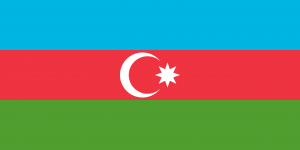Language/North-azerbaijani/Grammar/Asking-Questions
| ◀️ Leisure Activities — Previous Lesson | Next Lesson — Negation ▶️ |
As a North Azerbaijani language teacher with 20 years of experience, I want to help you learn how to ask questions correctly in North Azerbaijani. In this lesson, we will cover different types of questions, such as yes/no questions, wh-questions, and tag questions. We will also learn how to form and use negation in North Azerbaijani.
With the completion of this lesson, consider investigating these related pages: Adverbs & Questions.
Yes/No Questions
Yes/no questions are the most common type of questions in North Azerbaijani. We use them to ask for confirmation or to get a simple answer of "yes" or "no" to a question. The structure of this type of question is straightforward: just switch the subject and the auxiliary verb.
Here's an example:
- Sentence: Mən kitab oxuyuram. (I am reading a book.)
- Yes/No question: Kitab oxuyuramı? (Am I reading a book?)
In the yes/no question format above, we add the particle "-mı" to the end of the sentence to indicate a question. The particle "-mi" is used for singular subjects, whereas the particle "-lar mı" is used for plural subjects, as in the example below:
- Sentence: Siz kənddə yaşayırsınızmı? (You live in the countryside?)
Note that the word order in the example above is different from the previous example. When forming questions with verbs that don't have auxiliary verbs, we use the auxiliary verb "olmaq" in the present tense.
Here's an example:
- Sentence: Bura dükan var. (There is a store here.)
- Yes/No question: Burada dükan var mı? (Is there a store here?)
Wh-Questions
Wh-questions are used to ask for specific information. In North Azerbaijani, we use different question words (such as "kim" and "nə"), depending on the type of information we want.
Here are some common wh-question words:
- Kim: Who
- Nə: What
- Hansı: Which
- Necə: How
- Nəyə görə: Why
- Harada: Where
To form a wh-question, start with the question word and follow it with the subject and the rest of the sentence, as in the example below:
- Question Word + Subject + Verb + Object
- Hansı dükanda maraqlanırsınız? (Which store are you interested in?)
In the example above, we use the question word "hansı" (which) to ask about a particular store. The rest of the sentence follows the typical SVO (Subject-Verb-Object) word order of North Azerbaijani.
Tag Questions
Tag questions are a type of question where a declarative statement is turned into a question by adding a question tag at the end. A question tag is a short question added to the end of a statement, turning it into a question.
Here's an example:
- Statement: Biz burada deyilik, doğru? (We are here, right?)
- Tag question: Siz də buradasınız, yoxsa? (You're here too, aren't you?)
In the example above, we use the tag question "yoxsa" to ask for confirmation that the other person is also present. Notice how the tag question starts with "yoxsa," which means "or" in English.
Negation
Negation is a way to express the negative form of a sentence. In North Azerbaijani, we use the particle "deyil" or "yox" to form negation.
Here are some examples:
- Positive sentence: Mən kitab oxuyuram. (I am reading a book.)
* Negative sentence 1: Mən kitab oxumuram - (I am not reading a book.) * Negative sentence 2: Kitab oxumuram deyil. - (I am not reading a book.)
As you can see above, we use "deyil" or "yox" after the verb to form a negative sentence in North Azerbaijani.
Conclusion
You've learned about the different types of questions that can be asked in North Azerbaijani, including yes/no questions, wh-questions, and tag questions. You also learned how to use negation to form negative sentences. Keep practicing and try to use questions and negation in everyday conversations to master these concepts. Don't hesitate to ask your teacher for more examples and explanations, and remember to have fun while learning!
Upon wrapping up this lesson, take a look at these related pages: Present tense verbs & Plurals.
Other Lessons
- Negation
- Give your Opinion
- Expressing possession
- Present Tense
- Past Tense
- Basic Pronunciation Rules
- Future tense verbs
- 0 to A1 Course
- How to Use Have
- How to Use Be
Template:North-azerbaijani-Page-Bottom
| ◀️ Leisure Activities — Previous Lesson | Next Lesson — Negation ▶️ |

